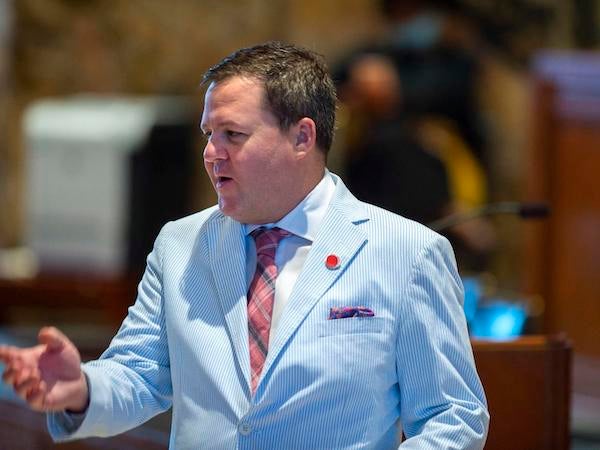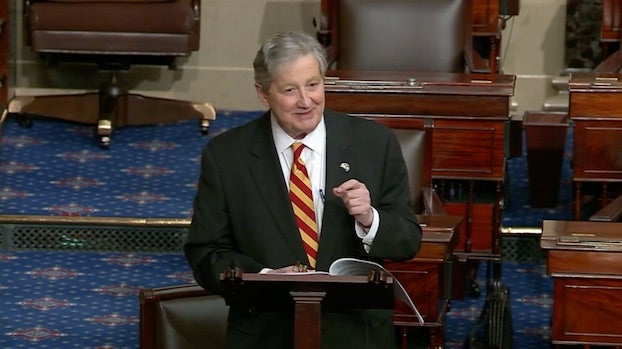Jim Beam column: Major tax battle on horizon
Published 6:52 am Wednesday, May 17, 2023

- Louisiana state Rep. Stuart Bishop, R-Lafayette, is in his last term in the Legislature and is tacking a major effort to end some of the state's many tax breaks.(Photo courtesy of nola.com).
A David vs. Goliath battle is underway at the Louisiana Legislature. Rep. Stuart Bishop, a Republican from Lafayette, has taken on the role of David. Goliath is the $7 billion given away every year by the state in tax exemptions, exclusions, credits, deductions, and other tax incentives.
Bishop took on the same role during the 2021 fiscal session, but in the face of stiff opposition during a hearing by the House Ways and Means Committee that he chairs, he voluntarily deferred his bill. Opponents of legislation fill out red cards and Bishop said there were 100 red cards submitted in 2021.
House Bill 641 is Bishop’s legislation this year. It is 108 pages long and lists 230 tax breaks that total $7 billion. There are income, corporate franchise, severance, sales and use, tobacco, petroleum, produce and excise taxes being targeted. The homestead exemption isn’t among them.
Only two red cards were submitted this year. They were turned in by the Louisiana Association of Business and Industry and the Louisiana Oil & Gas Association.
Some tax breaks already have sunset dates when they would be re-evaluated. Bishop’s measure sets a sunset date of Jan. 1, 2027, for other exemptions and exclusions. Each would expire by that date unless legislators vote to keep some alive.
The committee sent Bishop’s bill to the full House without opposition, and it is scheduled for debate Thursday. The Advocate said it was possible that Bishop’s bill sailed out of his committee because he is its chairman but a spokesperson for the Louisiana Municipal Association said, “Legislators seem willing to take on really big lifts on taxes this year.”
Bishop said, “With all the talk of tax reform that we’ve heard lately, this is an opportunity to get it started.”
The tax system is broken, Bishop said. He added that lawmakers this year are on target to approve another $2 billion in tax breaks. Bishop is term-limited and said going quietly is not his style.
The Advocate said he plans to return full-time to his job as sales manager for a Lafayette area-based company that provides concrete from dog yards to interstates. He is also part owner of the company.
“We cannot continue to say our tax system is broken, that we pay too much in taxes, until we look at all the giveaway programs,” Bishop said.
A long line of legislators has tried over the years to do something about the state having too many tax breaks, but their efforts haven’t produced significant results. Former state Rep. Julie Stokes, R-Kenner, for example, led a special committee that spent considerable time looking at sales tax breaks, but her legislation was rejected.
The state sales tax is only 4.45%, but there is a maximum local sales tax rate of 7.0%, which makes the combined tax an average of 9.55% highest in the country.
Bishop said if he can find a senator to handle his bill in the upper chamber his goal is to put legislation on Democratic Gov. John Bel Edwards’ desk. He said the state budget needs the stability that eliminating many tax breaks will provide.
State Sen. Bret Allain, R-Franklin, and Bishop’s counterpart in the upper chamber, said he likes Bishop’s bill to sunset all the tax breaks. “Every future Legislature should be forced to look at these credits to see if they’re worth it,” Allain said.
Allain is chairman of the Senate Revenue and Fiscal Affairs Committee, and he could be the senator Bishop needs to handle his bill. Allain has some major tax changes of his own on his legislative agenda.
Bishop admitted there are many good tax breaks, but they don’t get the scrutiny they should get. Some have obviously outlived their usefulness. A member of the Ways and Means Committee said, “It’s really not going to be easy to go through all of these (tax breaks).”
I have been following developments at the Louisiana Legislature closely for the last 55 years, and I have seen many measures similar to Bishop’s never get to first base. However, one of them called the Stelly Plan, named after the late Rep. Vic Stelly of Moss Bluff, did.
Voters in 2002 agreed to swap higher income taxes for eliminating sales taxes on food, utilities, and prescription drugs. It was true tax reform backed by the late-Gov. Mike Foster, but legislators eliminated the higher income taxes six years later. That set up eight years of major state budget problems.
Will things be different this time? Let’s hope so.





